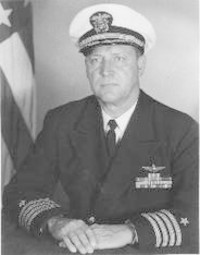Hall of Fame
McAfee, Frank M.

Captain Frank M. McAfee of Milledgeville, Georgia joined the Georgia National Guard at age 16 and once was called up by the governor during a textile workers strike. He resigned from the Guard and attended Young Harris College where he received an associate degree. McAfee received his wings in 1941 in the U.S. Navy. As an instructor at Corpus Christi, Texas, he was primary instrument instructor for George W. Bush, later to become President of the United States.
He later saw combat in the Pacific aboard the USS Ticonderoga, flying an F-6F Hellcat for Fighter Squadron 80. He participated in 15 major engagements with the Third and Fifth Fleets, winning the title of' “Ace" with his downing of six Japanese aircraft. He later earned a second Air Medal in the vicinity of the South China Sea attacking four enemy aircraft and shooting one down. In 1945, he made a direct hit on enemy ground installations causing explosions, fires and the complete destruction of an enemy hangar. McAfee survived a ferocious kamikaze attack on the Ticonderoga and was transferred to the USS Hancock. He was involved in action over Tokyo a month later, personally destroying three enemy planes in the air. This was part of the first attack on the Japanese homeland by carrier based aircraft. His air group was credited for downing no less than 71 Japanese planes on February 16, 1945 - the highest single one day victory total for any carrier group. Five days later, he flew aerial support for the Marines during the invasion of lwo Jima with a fighter sweep of 12 planes for two missions and hitting all targets. He was awarded four Air Medals and the Distinguished Flying Cross for his Pacific actions. After the war, McAfee joined the Naval Reserve and became Air Group Commander at Naval Air Station, Atlanta. He received permission to take two of his squadrons to Miami, Florida to operate with a carrier, proving that Navy reservists could work quickly and safely to deploy aboard a carrier if a national emergency were to occur. This was a very successful detachment, adopted by all reserve units, and today remains a vital part of the military reserve structure.
At the request of the Chief of Naval Operations, Lt. Commander McAfee returned to active duty as part of the Training and Administration of the Reserves (TAR) program. In 1964, he retired from active duty as Commanding Officer of the Naval Air Reserve Training Unit in Norfolk, Virginia. In recognition of his distinguished military contributions to aviation and his country, McAfee was enshrined during the centennial year of aviation in Georgia on April 28, 2007 into the Georgia Aviation Hall of Fame.
